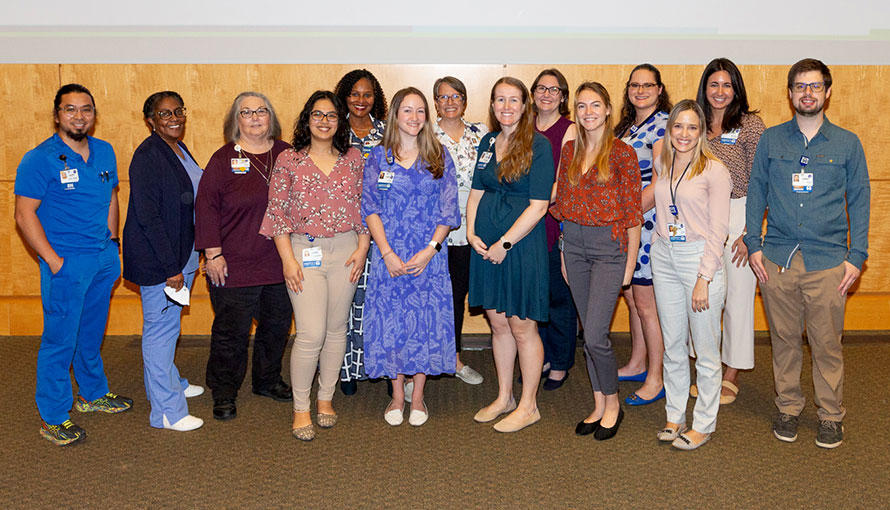The GeneHome Clinic at Moffitt

Genetic mutations increase risk for cancer. Genetic testing for cancer predisposition is a viable option for patients who may be at heightened risk for hereditary malignancies, which account for approximately 5 to 10% of cancers. When genetic mutation is identified, precision, prevention, earlier diagnosis and individualized cancer management are available.
At Moffitt Cancer Center, the specialized GeneHome Clinic helps patients and referring physicians manage preventive screening and treatment for high-risk individuals carrying cancer gene mutations. Our board-certified medical geneticists and other health care professionals collaborate to provide the service our patients need and deserve. Led by Dr. Xia Wang, the GeneHome Clinic works closely with Moffitt’s Genetic Risk Program to offer to test for all cancer-related gene mutations.
Advantages for patients
Moffitt’s GeneHome Clinic provides well-rounded medical services in a single location, including genetic testing, consultation, cancer screening and evidence-based cancer preventive services. As an integral part of the service, we also provide individualized education and counseling to the patients and their families based on the specific mutation they carry.
We are equipped to offer testing for mutations in large numbers of genes with a single test, known as a gene panel, covering dozens of hereditary cancer risk syndromes and as many as 100 cancer genes. Examples are:
- Hereditary breast and ovarian cancer syndrome (BRCA1 and BRCA2 genes)
- Li-Fraumeni syndrome (TP53 gene)
- Cowden syndrome (PTEN gene)
- Lynch syndrome (MLH1, MSH2, MSH6 and PMS2 genes)
- Hereditary paraganglioma and pheochromocytoma (SDHA, SDHAF2, SDHB, SDHC, SDHD, MAX, TMEM127 genes)
- Colon and gastrointestinal polyposis (APC and MUTYH genes)
- Hereditary leiomyomatosis and renal cell cancer (FH gene)
- Hereditary diffuse gastric cancer syndrome (CDH1 gene)
- Multiple endocrine neoplasia (MEN1 and RET gene)
- Familial atypical multiple moles and melanoma syndrome (CDKN2A gene)
- Peutz-Jeghers syndrome (STK11 gene)
- Neurofibromatosis type 1 (NF1 gene)
- Neurofibromatosis type 2 (NF2 gene)
- Schwannomatosis (SMARCB1 and LZTR1 genes)
- Fanconi Anemia
- Ovarian Cancer
- Juvenile polyposis syndrome (BMPR1A and SMAD4)
- Birt-Hogg-Dube syndrome (FLCN gene)
- Von Hippel-Lindau syndrome (VHL gene)
- Tuberous sclerosis complex (TSC1 or TSC2 gene)
- BAP1 tumor predisposition syndrome (BAP1 gene)
- Gorlin Syndromes (PTCH1 gene)
- DICER1 syndrome
- Prostate Cancer (HOXB13 gene included)
- Retinoblastoma (RB1 gene)
- CHEK2, ATM genes
Benefits for referring physicians
GeneHome serves as a “home base” for referring physicians and cancer specialists, helping to ensure clear communications between the professionals in Moffitt’s care team and community health care providers. GeneHome can also help to design, plan and coordinate complex screening schedules that are often overwhelming to the patients. Patients who carry high-risk cancer mutations are referred to and from GeneHome in a continuous and complete cycle. Additionally, Moffitt can support access and referral to recommended screening and preventive treatment services.
Personalized medicine in hereditary cancer
Besides cancer prevention and screening, personalized cancer management is also possible due to increased knowledge of the cancer mutation repertoire and the availability of agents that target altered genes or pathways. Our medical geneticists stay up-to-date on the latest advances in cancer genetics, risk prediction, technology, and therapeutics, to better inform each patient’s future clinical decisions. Clinical geneticists are a valuable resource about genetic testing, results interpretation and management based on test results.
To refer a patient to Moffitt’s GeneHome Clinic, please fill out the online form or contact a physician liaison. Moffitt keeps brief referral times to help ensure patients can receive the services they need as quickly as possible. We encourage health care providers to contact us with any questions they may have.
Genetic Counseling Program
